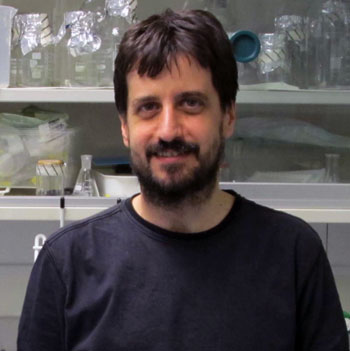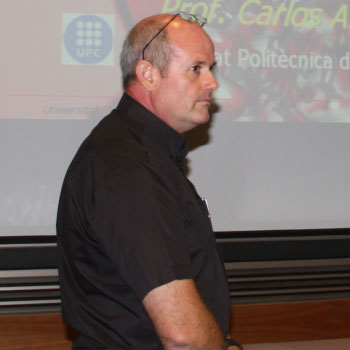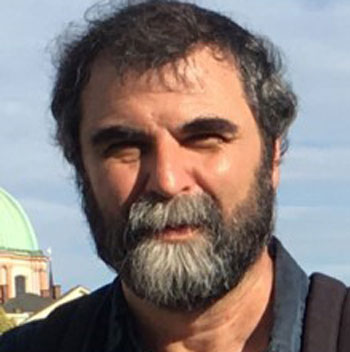 Jordi Alcaraz graduated in Phyisics at the Universitat de Barcelona (UB) and obtained his PhD in Biophyisics in the fields of Cellular Biophysics and Nanobioengineering in 2002. During his postdoc he pursued research aiming to understand how biophysical cues from the tissue microenvironment control differentiation and cancer progression at the single cell level. Currently he is a Serra-Húnter associate professor of the School of Medicine and Health Sciences at the UB since 2012, where he leads the “Translational Lung Mechanobiology” group. He is also a researcher of the Functional Unit of Thoracic Tumours at the Hospital Clinic of Barcelona and of the Spanish Respiratory Diseases Networking Biomedical Research Centre (CIBERES).
Jordi Alcaraz graduated in Phyisics at the Universitat de Barcelona (UB) and obtained his PhD in Biophyisics in the fields of Cellular Biophysics and Nanobioengineering in 2002. During his postdoc he pursued research aiming to understand how biophysical cues from the tissue microenvironment control differentiation and cancer progression at the single cell level. Currently he is a Serra-Húnter associate professor of the School of Medicine and Health Sciences at the UB since 2012, where he leads the “Translational Lung Mechanobiology” group. He is also a researcher of the Functional Unit of Thoracic Tumours at the Hospital Clinic of Barcelona and of the Spanish Respiratory Diseases Networking Biomedical Research Centre (CIBERES).
His research line is focused in the study of how the microenvironment controls cell behaviour and misbehaviour in normal and diseased conditions, particularly in lung cancer and fibrosis. Their goal is to define new therapeutic strategies against these diseases as well as to identify novel biomarkers. For this purpose, the group works in close collaboration with clinical groups, and often use primary tissue cells from patients.
 Carlos Alemán is Full Professor in the Department of Chemical Engineering in the Universitat Politècnica de Catalunya (UPC). Since 2003, he leads the Innovation in Materials and Molecular Engineering (IMEM). His research interest is focused on the utilization of conducting polymers, alone or combined with bio(macro)molecules for the development of biomedical and energy storage devices. In the last years, his group has developed electrochemical invasive and non-invasive sensors for the detection of biomolecules on demand release systems using electrical stimulation, smart devices for the simultaneous release and real-time monitoring of drugs, and flexible (bio)organic supercapacitors, some of them to power implantable biomedical devices.
Carlos Alemán is Full Professor in the Department of Chemical Engineering in the Universitat Politècnica de Catalunya (UPC). Since 2003, he leads the Innovation in Materials and Molecular Engineering (IMEM). His research interest is focused on the utilization of conducting polymers, alone or combined with bio(macro)molecules for the development of biomedical and energy storage devices. In the last years, his group has developed electrochemical invasive and non-invasive sensors for the detection of biomolecules on demand release systems using electrical stimulation, smart devices for the simultaneous release and real-time monitoring of drugs, and flexible (bio)organic supercapacitors, some of them to power implantable biomedical devices.
He has been awarded the Distinction for “Young Researchers to the Promotion of the University Research” by the Generalitat of Catalunya in 2003, the “I3 Research Intensification Award” in 2007 and two ICREA Academia Awards (2008-2015).
 Last incorporation, Jordi Puiggalí, is Full professor and Director of the Chemical Engineering Department at the Universitat Politècnica de Catalunya (UPC). He leads since 2002 the Research Group in Synthetic Polymers: Structure and Properties (PSEP) and belongs to the Center for Research in Science and Multi-Scale Engineering of Barcelona (BRCMSE). His research is multidisciplinary and involves aspects so varied as: structure of synthetic polymers, polymer crystallization, development of biodegradable polymers, study of nanocomposites and polymer physics and finally the development of new transformation processes: ultrasonic micromolding, surface nanotexturation and 3D printing.
Last incorporation, Jordi Puiggalí, is Full professor and Director of the Chemical Engineering Department at the Universitat Politècnica de Catalunya (UPC). He leads since 2002 the Research Group in Synthetic Polymers: Structure and Properties (PSEP) and belongs to the Center for Research in Science and Multi-Scale Engineering of Barcelona (BRCMSE). His research is multidisciplinary and involves aspects so varied as: structure of synthetic polymers, polymer crystallization, development of biodegradable polymers, study of nanocomposites and polymer physics and finally the development of new transformation processes: ultrasonic micromolding, surface nanotexturation and 3D printing.
His group works in the area of synthesis and study of the properties of new polymers, principally biodegradable materials. At the present time, the group has two main objectives, the development of biodegradable polymers for specialty applications such as bioabsorbable surgical sutures, drug delivery systems and scaffolds for tissue engineering, and the study of nanocomposites prepared from degradable polyesters and poly(ester-amide)s.





